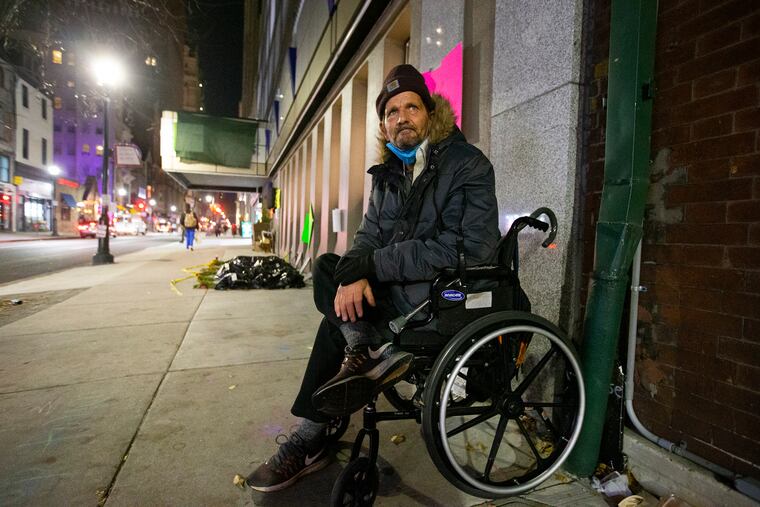As Philly’s COVID-19 hotels empty, some residents say they’re dismayed by conditions in their new accommodations
The tensions around the hotels are another mark of how the pandemic has upended life for Philadelphia’s most vulnerable residents.

This week, citing funding problems, Philadelphia officials are moving dozens of residents from its COVID-19 hotels — where vulnerable people with nowhere else to quarantine have been staying since the spring — to cheaper accommodations elsewhere in the city.
But several residents have raised concerns about conditions at the new sites — a former correctional halfway house in Feltonville, and another site in North Philadelphia — saying that they’re sharing bathrooms and worried about protecting themselves from the coronavirus. Some at the Feltonville site said they lacked heat and hot water.
One resident said she was washing herself in a sink because the facility’s showers were too cold to use.
In an interview Thursday, Liz Hersh, the director of the city’s Office of Homeless Services, pushed back on those claims, saying that she had investigated similar complaints but that residents do have heat and hot water.
Still, she acknowledged, the new accommodations are a step down from the Holiday Inn and the Fairfield Inn in Center City, the two hotels that housed homeless Philadelphians in need of a place to quarantine since the first wave of the pandemic.
“We knew this was going to be a hard move and it was going to be a letdown,” she said.
The tensions around the hotels and the new accommodations are another mark of how the pandemic has upended life for Philadelphia’s most vulnerable residents.
The hotels opened in the spring, and were designed to shelter Philadelphians most endangered by the coronavirus — elderly and chronically ill people who have nowhere else to go. Many have been homeless for years. Traditional shelters would put them at too high a risk of contracting the virus. More than 200 people have come through the hotels since they opened; all have been promised permanent housing, and 80 have moved into permanent housing, city officials said.
The city used federal funding from the Coronavirus Aid, Relief, and Economic Security Act to pay for the hotels. Originally, the CARES fund was set to expire in December, but cities now have more time to spend CARES money. Still, Hersh said: “They extended the time in which you can use the [CARES] money, but they didn’t add any more money.”
The city says it has spent $5.3 million in CARES funding to cover costs at the hotels between March and August, and are also planning to ask the Federal Emergency Management Agency to reimburse the city for more costs between March and December.
Now, city officials say they are trying to help residents while spending less.
But housing advocates have maintained that the city needs to do more to keep the hotels open, or at least replicate conditions there — where residents had their own rooms and bathrooms and were able to quarantine more effectively. In the new facilities, some residents are sharing bathrooms and, in some cases, rooms.
» READ MORE: Philly’s COVID-19 hotels for homeless people are shutting down over loss of federal funding
Residents who lived at the Center City hotels for months have said that they were given little warning about the move, and many were confused about where they were being moved to.
Once they arrived, some said, conditions at the new facilities were less than desirable. Pauline Jordan, a Navy veteran waiting on housing assistance from the Veterans Administration, said that the Feltonville site had no heat or hot water and that she was taking “bird baths” in the sink.
“I can’t believe this is how homeless people are treated,” she said.
Residents were also concerned about the site’s location in an industrial area, far from public transportation. Hersh said the city is setting up a van service to transport residents to Center City.
Judy Dennis, who moved to the North Philadelphia site at Ninth and Cambria Streets last month, said she initially did not have hot water, and shared photos showing a leaking ceiling, a duct-taped window, black grime along the edges of a tub, and a thermostat set to 57 degrees.
Hersh said that city officials feel they have “fully investigated the [heating] situation and addressed it.”
» READ MORE: What COVID-19 has taught medicine in 2020
“We’ve checked out every single complaint. We have found that there’s heat and hot water,” she said. “We never want people to be without heat and hot water. That’s completely unacceptable. That’s the most basic standard.
“It’s Philly,” she continued. “We have a lot of old sites. Sometimes the plumbing isn’t what we would like.” She said residents may have to wait for water to heat up when they turn it on.
Advocates say the city should be asking for continued FEMA reimbursements beyond December to keep the hotels open, or even consider taking out a loan.
City officials said that they are unsure whether FEMA will reimburse the city for homeless services and social services that go beyond establishing quarantine sites, and are reluctant to spend money they may not get back. “It’s very, very high risk for the city. The city is almost half a billion dollars down in revenue,” Hersh said.
Max Ray-Riek, a member of ACT-UP Philadelphia, the AIDS activism organization that’s been advocating for residents in the hotels, said the city must find more funding for hotel rooms, and “substandard” facilities are unacceptable.
“I understand the risk — if they put out millions of dollars, that’s really hard in a bleak budget picture,” he said. “But I genuinely think FEMA wants to work with cities. [City officials] aren’t exploring every option. They’re exploring a small set of the worst possible options.”